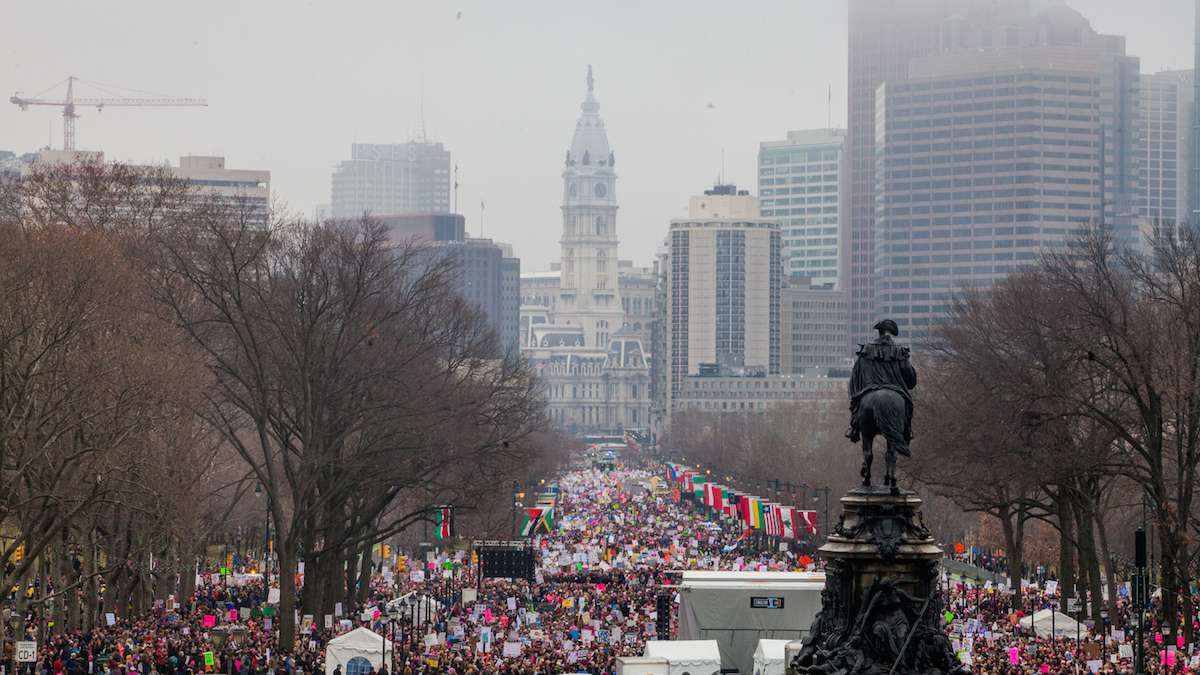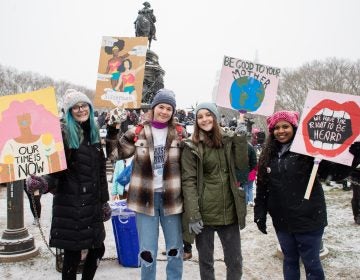Women’s March organization doesn’t like to be questioned, not even by a progressive woman

Thousands gathered on the Ben Franklin Parkway the morning of Saturday, January 21, for the Women's March in Philadelphia. (Brad Larrison for NewsWorks)
In January 2017 the Women’s March organized under the affirmation that “women’s rights are human rights.” An estimated 5 million people marched around the world that day in solidarity.
Just six months later, the organizers planned a Women’s March Against Gun Violence, an issue that adversely affects women in many different ways. Fifty women are killed every month by an intimate partner, and in a domestic violence situation women are five times more likely to be killed when there is a gun involved. Those statistics are particularly striking as there are no federal laws preventing abusive partners from obtaining guns: 41 states do not require those convicted of domestic abuse to turn in guns they already own, and in 35 states there are no laws preventing those convicted of domestic abuse from purchasing new guns.
The guiding visions and principles of the Women’s March includes a few statistics about violence against women and the fact that women of color are disproportionately vulnerable. They state that the March seeks to honor those women and advocate for “full and healthy lives, free of all forms of violence against our bodies.” However, the Women’s March provides no information for those marching about gun violence as it relates to women — not one statistic or citation or link for anyone interested in learning more. On every page, though, “shop” and “donate” links are prominent.
The march in July, which was estimated to include fewer than 2,000 attendees, was organized when members of the Women’s March took personal offense to a video created by the National Rifle Association. Called “The Violence of Lies,” and featuring conservative talk-show host Dana Loesch, it is certainly inflammatory but not unusual for the NRA. The video refers to progressive protesters vaguely as “they” and identifies the group as those spreading the “violence of lies” in the title. It does not expressly mention the Women’s March.
As part of a statement in response to the video, Women’s March organizers said:
Please join the Women’s March and our partners in exercising our First Amendment rights by holding a mass mobilization for our safety, calling on the NRA to take the following actions:
1. Take down the recent irresponsible and dangerous advertisement videos from all social platforms immediately.
2. Issue an apology to the American people for the video that suggests armed violence against communities of color, progressives and anyone who does not agree with this Administration’s policies.
3. Make a statement to defend Philando Castile’s Second Amendment right to own a firearm and demand the Department of Justice indict the police officer who killed him for exercising his Second Amendment right and his privilege as a licensed concealed carry permit holder. This call is clearly in line with the mission and purpose of the NRA as an organization that purports to be the lobby and defender of the right to bear arms.
The Sunday after the July 16 Women’s March Against Gun Violence, I saw a video posted online in which a woman said that 30,000 people were killed due to gun violence every day. Having done research over the years on gun violence, I knew that statistic was false, and chalked it up to someone speaking without a script to a crowd and being caught up in the moment. (In truth 12,000 people die every year from gun violence.) Moments later, the woman mentions that 90 people would die that day due to gun violence. That statement was true.
The variance in this woman’s speech made me interested in what information was being disseminated by the Women’s March about gun violence as a whole and as it related to women. On their social media sites there were many pictures of Philando Castile and calls to donate to the march through Crowdrise, but no information or statistics about gun violence against women. There was only one photo posted of a woman who lost her life to gun violence in the weeks leading up to the event. No links to sites where information about gun violence could be found. I found myself asking a lot of questions about what was going on with the organization that now called itself Women’s March.
As the story goes, a grandmother in Hawaii named Teresa Shook started a Facebook event after the 2016 election of Donald Trump encouraging women to March on Washington after his inauguration. A January Vogue article depicts the organization as dynamic and fluid, depicting a multitude of organizers in what Bob Bland, one of the movement’s cofounders, called a “horizontal approach to leadership.”
In the six months since the organization formed, a hierarchy has emerged. By April the leadership the Vogue article referred to as “organic,” had been whittled down to four selected women, three of whom had previously worked together — none of whom were Teresa Shook.
The current hierarchy includes Tamika Mallory and Carmen Perez, both of The Gathering for Justice, Harry Belafonte’s charity that was the original umbrella organization for the Women’s March, Linda Sarsour, and Bland (who initially became involved after selling “Nasty Woman” t-shirts online and connecting with Shook). Bland and Mallory act as co-presidents of the march organization, Perez is treasurer, and Sarsour is assistant treasurer.
When I first reached out to members of Women’s March, I received prompt responses from Bland. I was then directed to the organization’s public relations team at Sunshine Sachs. A relatively small multi-million dollar spin machine for the rich and famous, the company is known for many things. They are the authors of Janet Jackson’s NFL halftime wardrobe malfunction at the hands of Justin Timberlake. The agency infamously edited the Wikipedia entries of their celebrity clients, such as Naomi Campbell, in 2015, to remove evidence of negative press. Once a top-tier firm, they fall lower on “Power PR” lists every year, sliding from No. 1 on The Observer’s List to number 29 within a year.
They were eager to discuss their current endeavors, until I started asking too many questions. In an email I sent to the entire team, I asked why a single man was chosen to be a focal point of the march against gun violence. I said that, while I understood that civil rights for all matters to this organization, the NRA video featured a woman, and Women’s March is an organization for women, and the utter omission of information about how gun laws impact women was confusing. I asked about the response to the NRA video, and what was meant by the words “irresponsible and dangerous” without mention of gun violence against women.
The Women’s March is registered with the IRS as a 501(c)(4) organization, meaning that any donations made to the organization are not tax deductible. By July 2017, the organization raised over $100,000 through their Crowdrise campaign. I asked if they had a major financial backer. I questioned why the organization is asking for public donations and what they planned on doing with the money raised — for example, would they create grant programs that localized women’s groups could apply for?
The Sunshine Sachs representatives I spoke with informed me the leadership team would entertain speaking to me about promoting their work, but that they would not answer any of my questions about finances. The representatives became extremely defensive about my questions, which I provided well in advance, before abruptly ending the call.
I left the conversation feeling shaken. As a mother, a woman with a disability, an organizer myself in the past, I found that their secrecy and inability to answer simple questions without either becoming agitated or cutting off contact shattered the illusion the Women’s March organization had created for itself over the past few months. The once seemingly “organic movement for all women” that professed “to harness the political power of diverse women and their communities to create transformative social change … a women-led movement providing intersectional education on a diverse range of issues and creating entry points for new grassroots activists” is manufactured. It does not have access points for “new grassroots activists.” It does not provide education or information on pressing issues related to women. It has been reduced to a website selling t-shirts, themselves, and a cult of personality, displaying it as an act of resistance.
WHYY is your source for fact-based, in-depth journalism and information. As a nonprofit organization, we rely on financial support from readers like you. Please give today.



